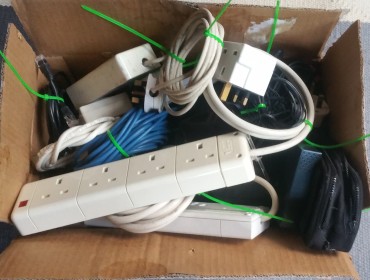Unwiring
 Say you haven't moved (house) in 30 years without saying you haven't moved in 30 years. Or say you're over 50 without saying you're over 50. "I just pulled a big box of wires out of my house."
Say you haven't moved (house) in 30 years without saying you haven't moved in 30 years. Or say you're over 50 without saying you're over 50. "I just pulled a big box of wires out of my house."
What began as a project to turn the attic (loft) into more usable space has metastasized all over the house (apartment), as every crowded corner gets reevaluated. Behind every piece of furniture, some being moved for the first time since 1991, lurk wires. Wires of all kinds. Speaker wire that ran to the amplifier down the hall. TV cables connecting various items - computer, DVD player, the VCR I can't throw out until all the tapes are gone. Ethernet cables, because wired connections are more stable. Telephone cables running to remote extensions that were replaced with DECT phones 15 years ago. A weird, extraordinarily thin wire for a device called a Rabbit that once connected the TV in my office to the cable box in the living room; an infrared sender even let you change channels. All of the cable box, the Rabbit, and the TV are long gone, but the wire lives on because it runs behind furniture that has settled too deeply into the carpet to move. Even now, I haven't got it all out. And, because this apartment (flat) has just one single electrical outlet per room, multio-way extension cords and plugs *everywhere*.
The phone, stereo system, and TV cabling went in first. Layered on top of all that was an ethernet network that accreted over time to serve various computers in odd locations. There was an extra wifi router in the living room because the original one's wifi didn't reach the kitchen. And so on. So the box of pulled wiring also includes three network switches, which still leaves two in place. This in a four-room flat!
I still haven't touched the Giant Rat of Sumatra's nest behind my desk.
This is the result of 30 years of adding bits that were needed at the time but never subtracting them when their original purpose has gone. If you move frequently this sort of thing doesn't happen because you tear it all down and build back only what you need each time. I know, because between the ages of 17 and 27 I moved nine times. I got really good at packing books and LPs. (Say you're over 60 without saying you're over 60.)
Were I a 30-something modern renter, my entire life would lift out of each successive abode leaving no trace and requiring few boxes. My books, audio, and video would be computer files or streaming subscriptions. All my telecommunications connections would be wireless. And, for best results, any furniture I had would be either on 30-day free trial or inflatable. It's like having a printer: modern people are app people. Wires need not apply. Wires are for old people. Wires...are a sign of privilege.
I now realize that accretion has led me to the equivalent of buying a tractor but continuing to feed and care for the Clydesdale horses it replaced without really noticing they're no longer doing anything useful. Or, in a higher-risk example, this sort of accretion leads older people into overly complex medication regimes as their doctors add new medications, often to control the side effects of the ones they're already on, without reconsidering the whole list; that situation is common enough to have bred a subspecialty of pharmacology to review and rationalize people's medications.
More technologically, there's the phenomenon consultants remark upon of finding ancient machines, even in banks that are running mission-critical but ancient software no one dares touch because no one knows how it works. I suspect that as the time between computer replacements continues to lengthen accretion of this type will be the fate of all computer systems. The reason is simple: adding things to patch localized problems without touching what's already in place will always feel safer than pulling an unlabeled plug and risking breaking the whole system because you didn't understand the complex dependencies. And there's little motivation. For the most part, everything works fine until one day the increasing complexity overwhelms the system and it all falls over - at which point tracing and the fault is excruciatingly difficult, and fixing will likely require a workaround that, like the one for the Y2K bug, has an expiration date when you'll have to trace and replace - or find another workaround.
There are lots of knock-on effects from accretion, most notably unnoticed security vulnerabilities. In her days running RISCS, Angela Sasse used to say that often important solutions to endemic cybersecurity problems are overlooked because they're not specifically technological fixes. Instead, she argued, reducing stress on employees by ensuring they're not overworked and have systems that make their work easier instead of harder, pays dividends in fewer mistakes. Similarly, upgrading and replacing old equipment with newer equipment with better security and usability built in can solve many seemingly intractable problems, over time costing less than continuing to patch the old system.
In my own case, there was a small but definite cost in wasted electricity (those extra switches) and, I imagine, a slightly higher risk of fire (all those extension cords). Life, as Gilbert and Sullivan observed, is a closely complicated tangle.
Illustrations: The box of wires, with more to come.
Wendy M. Grossman is the 2013 winner of the Enigma Award. Her Web site has an extensive archive of her books, articles, and music, and an archive of earlier columns in this series. Stories about the border wars between cyberspace and real life are posted occasionally during the week at the net.wars Pinboard - or follow on Mastodon or Twitter.